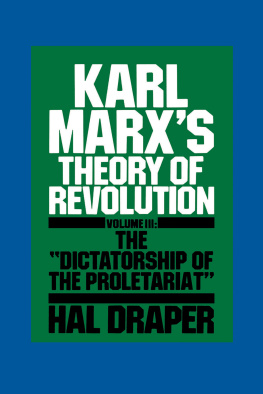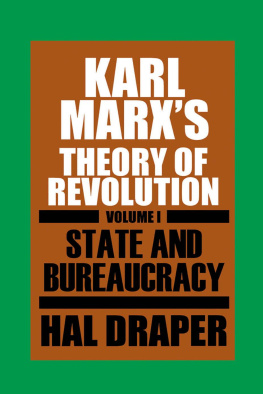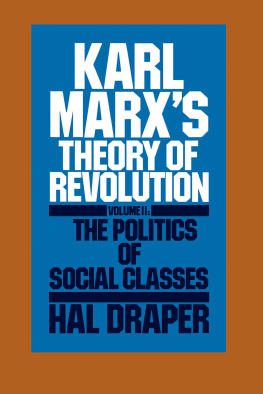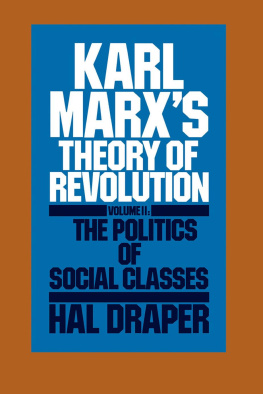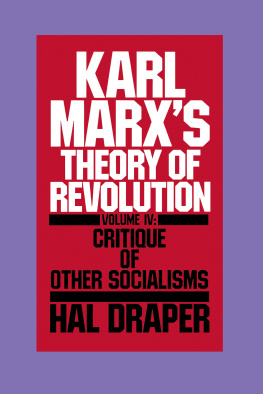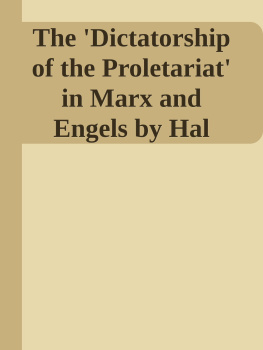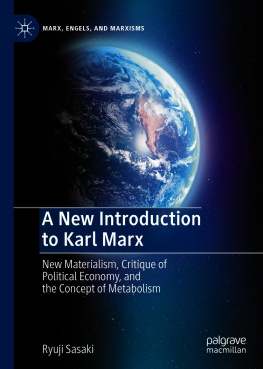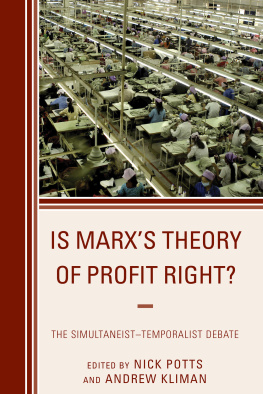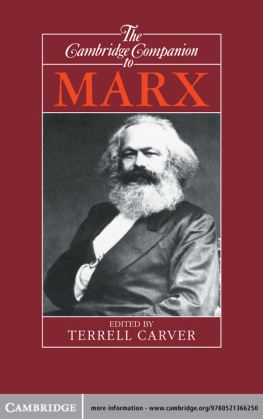Thank you for buying this ebook, published by NYU Press.
Sign up for our e-newsletters to receive information about forthcoming books, special discounts, and more!
Sign Up!
About NYU Press
A publisher of original scholarship since its founding in 1916, New York University Press Produces more than 100 new books each year, with a backlist of 3,000 titles in print. Working across the humanities and social sciences, NYU Press has award-winning lists in sociology, law, cultural and American studies, religion, American history, anthropology, politics, criminology, media and communication, literary studies, and psychology.
KARL MARXS THEORY OF REVOLUTION
Copyright 1986 by Hal Draper
All rights reserved
Library of Congress Cataloging-in-Publication Data
Draper, Hal.
Karl Marxs theory of revolution.
Includes bibliographies and indexes.
Contents: v. 1. State and bureaucracy, v. 2. The politics of social classes, v. 3. The dictatorship of the proletariat.
1. Marx, Karl, 1818-1883. 2. Revolutions and socialism, I. Title.
JC233.M299D7 321.09 76-40467
ISBN: 978-0-85345-674-2
Monthly Review Press
146 West 29th Street, Suite 6W
New York, NY 10001
www.monthlyreview.org
FOREWORD
This volume of Karl Marxs Theory of Revolution (KMTR) is not about the dictatorship of the proletariat. It is about the dictatorship of the proletariat.
That is, it is about the term. The difference takes us to the very heart of the present work. Let me explain.
1
This volume of KMTR is a bridge between the first two volumes and the next two. As presently planned, Volume 4 will take up Marxs views on other socialisms and on the road to power; Volume 5, workers state and socialist society, that is, postrevolutionary problems. My original intention was to discuss the dictatorship of the proletariat in the last volume, since it is properly related to the workers state period. This is entirely proper in terms of the real meaning of dictatorship of the proletariat, but it is unsatisfactory if we are to deal with the way dictatorship of the proletariat has actually figured in the history of Marxist thought.
It is going to be our conclusion (this can be revealed in advance) that Marx used the term to mean nothing less and nothing more than a workers state what he commonly called the conquest of political power by the proletariat. The period following a socialist revolution had several interchangeable labels in Marxs writings: workers state, the political ascendancy (or sway, Herrschaft) of the proletariat, workers political (or state) power, the rule (Herrschaft) of the proletariat, and some others; and one of these, used in certain contexts, was the dictatorship of the proletariat.
But this simple view has not been the usual one, as we will see. One of the problems is the persistent raising of the wrong questions. Thus, it has been written a thousand times, in complaint, condemnation or regret, that Marx failed to describe his dictatorship of the proletariat in any detail. But this assumes that there is something special to describe, other than the workers state in general; and this is precisely what is untrue. Of course, it is quite in order to complain that Marx did not write more fully on what a workers state would or should look like, though here the reasons for his reluctance are better known. But in any case, the two complaints are one: there is no special revelation about the dictatorship of the proletariat (properly understood) that he could have made.
Marx, contrary to myth, had a good deal to say about the problems of the postrevolutionary period. There is the problem of defending the workers state against counterrevolution; of using force against enemies; of rooting out (or smashing) the old state machinery; of recasting governmental forms so as to maximize democratic control; and so on. All of these problems and more are raised by the term workers state or its equivalents. Some of these problems have already been touched on in the first two volumes of KMTR, and, as mentioned, the postrevolution period as a whole will be the subject of the last volume.
The present volume, then, does not have the task of setting forth Marxs positive views in this very important area. It does something else: it undertakes to clear away the underbrush that stands in the way of understanding Marxs ideas.
I said that many problems are raised by the term workers state, but no one would suggest that the term itself provides answers. The case is different with the term dictatorship of the proletariat. Is it not true that this term was invented precisely because it points to special policies, policies that are specially dictatorial in some way? Do you not have a dictatorship of the proletariat only if you do something sturdily dictatorial like, say, disfranchising the bourgeoisie, or giving double voting rights to certified proletarians, or at least occasionally throwing a brace of your critics intojaiL. ?
This is the sort of assumption that confers a special freight of meaning on dictatorship of the proletariat, a burden that none of the other terms is thought to carry. This is the assumption that has been so thoroughly embedded in all literature about Marxism that it is seldom even discussed.
We know why this state of affairs persisted. The well-known fact is that the term dictatorship of the proletariat became a political football as soon as the Russian Revolution of 1917 presented its new state as a dictatorship of the proletariat. Communists and social-democrats, flanked by historians, scholars, and exegetes, launched into a bitter controversy, decade after decade, purporting to argue about what Marx meant by the dictatorship of the proletariat. In reality, the debate was usually over something else, revolving around the Soviet state and its course of development, finally around the counterrevolution represented by the rise of Stalinism. I grant that this something else was of the greatest importance; but it was not clarified by a camouflaged assault on another front. The phrase dictatorship of the proletariat acquired the status of a shibboletha code word for both sides.
After most of a century of this sort of disputation, Marxs ideas on the subject were buried under the mass of burnt-out squibs, dud cannonballs, and fizgigs exploded during this ideological warfare. Few of the controversialists even cared much about what old Marx thought of it all, so long as a point could be scored in the real battle: the battle over the Russian Revolution and, later, over its corpse embalmed by Stalin.
This battle is not waged in the present volume. We will deal with the history of the question only through Marxs and Engels lifetime, that is, to 1895. For the rest of this history, see Section 4 below.
2
As a result of the ideological wars, at almost every stage of the present investigation we have to strike down myths about Marxs and Engels relationship to this and allied questions. In doing so, we have to deal with many statements that arewell, untrue. Now English is tricky about words like false, falsity, falsehood, falsification, and the like. The first two, says Merriam-Websters, do not necessarily imply conscious desire to deceive; the other two do. Now I happen to believe, with Dr. Johnson, that deliberate deceit in this area is rare: It is more from carelessness about truth than from intentional lying that there is so much falsehood in the world, said the great lexicographer, using falsehood neutrally. Carelessness is not the main point: most people are so expert at sincerely believing whatever is convenient that simple mendacity is unnecessary; self-deception is the most effective kind.

